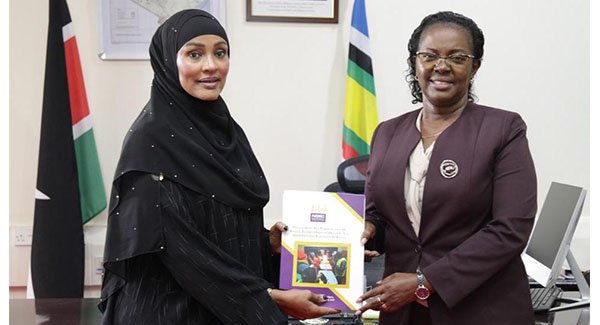NGEC Strengthens Ties with State Department for Gender to Advance Equality
Nairobi, Kenya –The National Gender and Equality Commission (NGEC) Chairperson, Hon. Rehema Jaldesa, led a high-level delegation to the State Department for Gender and Affirmative Action, where they held discussions with Principal Secretary (PS) Ms. Anne Wangombe. The engagement aimed to strengthen collaboration on gender equality and the empowerment of women and special interest groups in line with national, regional, and international commitments.
During the courtesy call, Hon. Jaldesa and PS Wangombe explored key policy areas, including Kenya’s compliance with international treaties on equality, the recognition and support of the care economy, and the progress toward ratifying the International Labour Organization (ILO) Convention 190 on Violence and Harassment in the World of Work.
Kenya is a signatory to multiple international treaties and protocols that promote gender equality, including the Convention on the Elimination of All Forms of Discrimination Against Women (CEDAW), the Maputo Protocol, the Beijing Platform for Action, and the Sustainable Development Goals (SDGs), particularly Goal 5 on Gender Equality. The NGEC delegation emphasised the need for enhanced implementation and accountability mechanisms to ensure Kenya meets its obligations under these treaties.
PS Wangombe affirmed the government’s dedication to domesticating and enforcing gender equality commitments, integrating them into national policies, and aligning with the Constitution of Kenya 2010, which enshrines the principles of equality and nondiscrimination.
A major evidence-based policymaking. discussion point was the care economy—a sector that remains largely undervalued despite its significant contributions to economic and social development.
The care economy encompasses unpaid and paid care work, including domestic work, childcare, eldercare, and healthcare services, predominantly undertaken by women.
Hon. Jaldesa underscored the urgent need for policy interventions that recognise, reduce, and redistribute unpaid care work, including investments in social infrastructure, parental leave policies, and support for domestic workers. The meeting highlighted the importance of data collection to quantify the economic impact of care work and inform A major evidence-based policymaking.
The delegation also discussed the ratification and implementation of ILO Convention 190 (C190), which addresses violence and harassment in the workplace.
The meeting underscored the need for sustained collaboration between NGEC, the State Department for Gender, civil society organisations, and development partners to drive gender-responsive policies and programmes. Both institutions committed to joint advocacy efforts, capacitybuilding initiatives, and continuous engagement with stakeholders to ensure meaningful progress on gender equality.
This courtesy call marks a pivotal step in deepening institutional synergies and reinforcing Kenya’s resolve to advance gender equality, economic empowerment, and the protection of vulnerable groups.
With renewed commitment from both NGEC and the State Department for Gender, Kenya is poised to accelerate efforts in creating a more just and equitable society for all.
NGEC Chairperson, Hon. Rehema Jaldesa, poses for a photo with Anne Wang’ombe, Principal Secretary, State Department for Gender and Affirmative Action


Comments